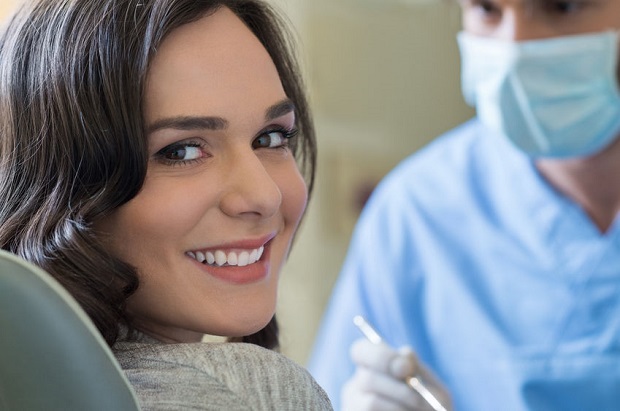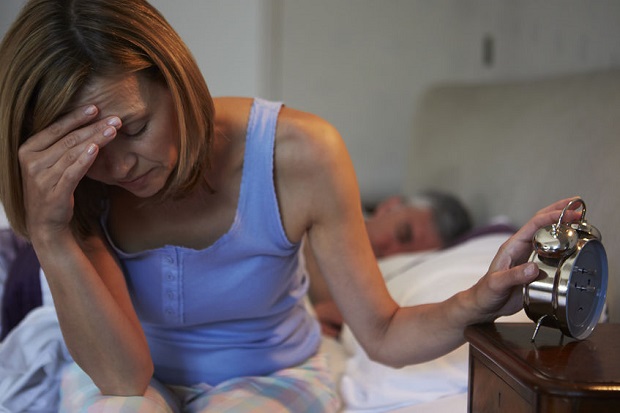
Is There a Connection Between Menopause and Insomnia?
Yes, there is a connection between menopause and insomnia. In fact, sleep disorders, particularly insomnia, are one of the main symptoms of menopause. [1] Because advancing age is also a risk factor for sleep disorders, scientists are uncertain as to what extent menopause factors. [2]
Jump Ahead
- The Insomnia Menopause Connection
- Ovarian Hormones Linked to Sleep
- Hot Flashes, Menopause, and Sleep
- RLS, Menopause, and Sleep
- Low Magnesium, Menopause, and Sleep
- Obstructive Sleep Apnea and Menopause
- Resources
The Insomnia Menopause Connection
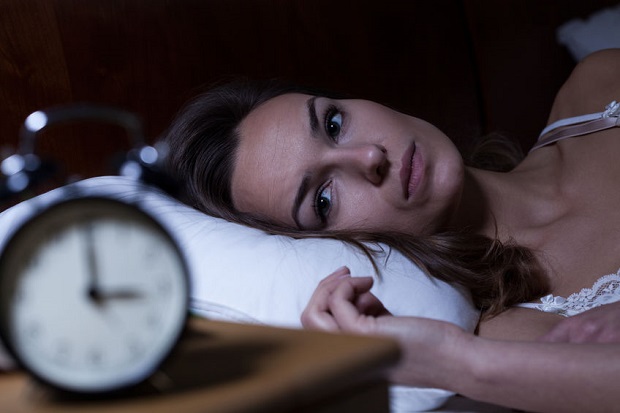
Insomnia predominantly affects women more than men, and age increases the gap. [3] The problem intensifies during peri-menopause, the three to four years prior to menopause, when hormones begin to decline. [4] During this transition stage, 16-47% of women report suffering from sleep disorders. Older women who are post-menopausal, that is, have not menstruated for more than one year, are the most affected by sleep disorders. Post menopause, 35-60% of women complain of sleep disorders, particularly insomnia. [5]
Ovarian Hormones Linked to Sleep
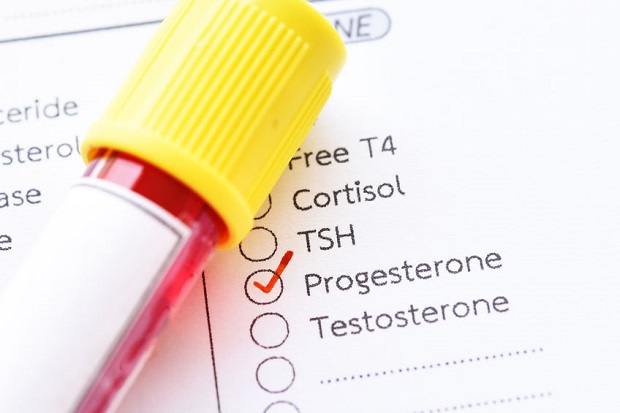
Research has linked ovarian hormones to sleep. The decline of estrogen and progesterone levels during menopause are key factors in the onset of insomnia. Scientists have linked estrogen to decreased awakenings after sleep occurs [6], while progesterone acts as a sedative. [7]
Further, the loss of these hormones factors in several menopausal symptoms that have the potential to disrupt sleep.
Hot Flashes, Menopause, and Sleep

Estrogen depletion at menopause plays a role in the occurrence of hot flashes, those intense minutes that the body experiences intense heat, sweating, and chills. Hot flashes can interrupt sleep patterns. [8]
RLS, Menopause, and Sleep
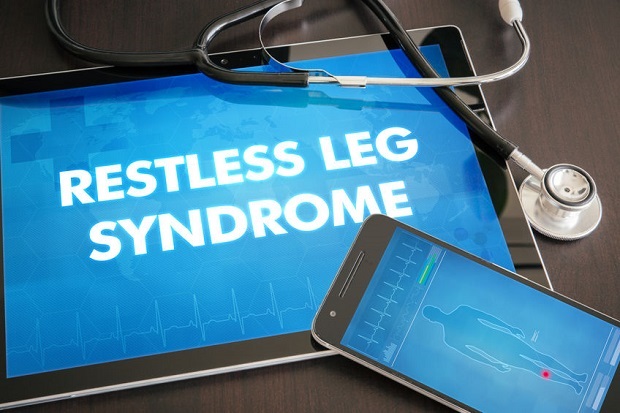
Estrogen also plays a role in triggering restless leg syndrome, as demonstrated through research indicating that the prevalence of RLS increases significantly in pregnant women as their estrogen levels rise. But the same is true of menopausal women with dropping estrogen levels indicating that RLS may be brought on by the fluctuation of hormones. RLS leads to sleep loss. [9]
Low Magnesium, Menopause, and Sleep

Low magnesium has been associated with disrupted sleep and sleep deprivation and is often seen in menopausal women. [10] Dropping estrogen and progesterone levels have been linked to low magnesium levels in the body, which function as a “relaxant” reducing sleeplessness during menopause. [11]
Obstructive Sleep Apnea and Menopause
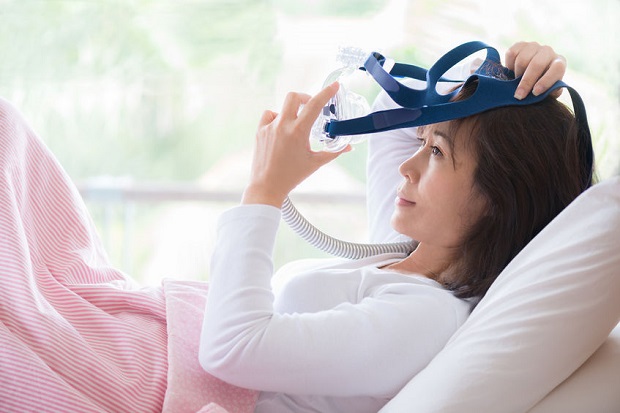
Menopause appears to be a significant risk factor for sleep apnea in women. [12] Progesterone stimulates breathing, and both estrogen and progesterone protect from sleep-disordered breathing. [13] More than 29% of people with OSA also suffer from insomnia. [14]
Resources
- [1] [6] Lee, Jinju, et al. “Sleep Disorders and Menopause.” Journal of Menopausal Medicine, vol. 25, no. 2, 2019, p. 83, https://doi.org/10.6118/jmm.19192.
- [2] Brown, Alana M, and Nicole J Gervais. “Role of Ovarian Hormones in the Modulation of Sleep in Females across the Adult Lifespan.” Endocrinology, vol. 161, no. 9, 2020, https://doi.org/10.1210/endocr/bqaa128.
- [3] Krishnan, Vidya, and Nancy A Collop. “Gender Differences in Sleep Disorders.” Current Opinion in Pulmonary Medicine, vol. 12, no. 6, 2006, pp. 383–389, https://doi.org/10.1097/01.mcp.0000245705.69440.6a.
- [4] Harvard Health Publishing – Harvard Medical School – “Perimenopause: Rocky Road to Menopause.”
- [5] Tandon, VishalR, et al. “Menopause and Sleep Disorders.” Journal of Mid-Life Health, vol. 13, no. 1, 2022, p. 26, https://doi.org/10.4103/jmh.jmh_18_22.
- [7] Jehan S, Masters-Isarilov A, Salifu I, Zizi F, Jean-Louis G, Pandi-Perumal SR, Gupta R, Brzezinski A, McFarlane SI. Sleep Disorders in Postmenopausal Women. J Sleep Disord Ther. 2015 Aug;4(5):212. Epub 2015 Aug 25. PMID: 26512337; PMCID: PMC4621258.
- [8] Freedman, Robert R. “Menopausal Hot Flashes: Mechanisms, Endocrinology, Treatment.” The Journal of Steroid Biochemistry and Molecular Biology, vol. 142, 2014, pp. 115–120, https://doi.org/10.1016/j.jsbmb.2013.08.010.
- [9] Seeman, Mary V. “Why Are Women Prone to Restless Legs Syndrome?” International Journal of Environmental Research and Public Health, vol. 17, no. 1, 2020, p. 368, https://doi.org/10.3390/ijerph17010368.
- [10] Nielsen, Forrest. “Magnesium Supplementation Improves Indicators of Low Magnesium Status and Inflammatory Stress in Adults Older than 51 Years with Poor Quality Sleep.” Publication : USDA ARS, 10 Dec. 2010, www.ars.usda.gov/research/publications/publication/?seqNo115=260055.
- [11] Kolanu, Bhagavan Reddy, et al. “Activities of Serum Magnesium and Thyroid Hormones in Pre-, Peri-, and Post-Menopausal Women.” Cureus, 2020, https://doi.org/10.7759/cureus.6554.
- [12] BIXLER, EDWARD O., et al. “Prevalence of Sleep-Disordered Breathing in Women.” American Journal of Respiratory and Critical Care Medicine, vol. 163, no. 3, 2001, pp. 608–613, https://doi.org/10.1164/ajrccm.163.3.9911064.
- [13] Saaresranta, Tarja, and Olli Polo. “Hormones and Breathing.” Chest, vol. 122, no. 6, 2002, pp. 2165–2182, https://doi.org/10.1378/chest.122.6.2165.
- [14] Cho, Yong Won, et al. “Comorbid Insomnia with Obstructive Sleep Apnea: Clinical Characteristics and Risk Factors.” Journal of Clinical Sleep Medicine, vol. 14, no. 03, 2018, pp. 409–417, https://doi.org/10.5664/jcsm.6988.
DISCLAIMER: THIS WEBSITE DOES NOT PROVIDE MEDICAL ADVICE
The information, including but not limited to text, graphics, images, and other material on this website, is for informational purposes only. No material on this site is intended to be a substitute for professional medical advice, diagnosis, or treatment. Always seek the advice of your physician or other qualified healthcare providers with any questions you may have regarding a medical condition or treatment before undertaking a new healthcare regimen, and never disregard professional medical advice or delay in seeking it because of something you have read on this or any other website.



